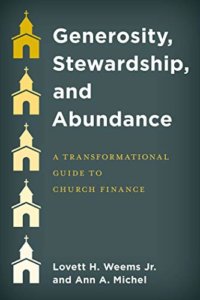How can churches help a new generation of givers skeptical of institutional allegiances embrace the practice of pledging? Ann Michel of the Lewis Center staff says it’s critical to frame the conversation around spiritual rather than institutional needs. She makes the case for pledging as a vital spiritual discipline that helps us grow in generosity and faith.
Does your stewardship campaign revolve around a pledge drive? In the not-too-distant past, many churches and churchgoers took pledging as a given. Members dutifully, even happily, marched their pledge cards to the altar each Commitment Sunday. It was just what was expected.
But now, many churches have to work a little harder each year to make the case for pledging and still they see the percentage of givers who pledge drop off a bit more with each campaign. It seems that a new generation skeptical of institutional allegiances is not nearly as quick as their forebearers to take membership vows or sign pledge cards.
In my church, some have even wondered whether we should abandon the pledge system all together. “If people don’t want to pledge, why do we keep asking them?” But that’s a bit like a parent saying, “My kids don’t like brushing their teeth so maybe I should stop reminding them.” Just like the habit of tooth brushing is important to our physical health, the practice of giving and pledging is important to our spiritual health.
The spiritual argument for pledging
One reason the appeal of pledging is waning may be that the conversation revolves almost entirely around the church’s needs. We remind people that pledges regularize the church’s income flow and help it budget more accurately. Making their pledge promptly helps the finance committee get on with the important work of finalizing the budget. We talk about budget gaps and the bottom line. But the problem with these arguments is that they are grounded in institutional needs.
Effective stewardship ministry is never about the church’s need to receive money. It is always about the giver’s need to give. God wants each of us to experience the joy of generosity. Created in the image of our generous God, we are made to reflect God’s generosity. And God calls us to become partners in God’s work in the world through our gifts. As we grow in generosity, we grow in godliness and discipleship. So, how can we help a new generation of givers to see pledging as way to develop their generosity and grow in faith?
Pledging helps us embrace the spiritual discipline of giving.
Like prayer, scripture reading, fasting, and dedication to service, the practice of giving regularly and intentionally helps us grow in faith and mature spiritually. It serves as a continual reminder of God’s claim on our lives. It requires us to put our own needs and wants into proper perspective, to set aside our own interests for the sake of God and others. Generosity is a tool God uses to shape our hearts. And through the spiritual discipline of giving, our hearts become one with God’s heart and our faith grows. Pledging helps us embrace the spiritual discipline of regular, faithful giving.
Pledging helps us grow in generosity.
In their major study of the giving habits of American Christians, sociologists Christian Smith and Michael Emerson found that in every denomination studied those who filled out pledge cards contributed significantly more money that those who did not. Their evidence led them to conclude that the process of annual planning, deciding, and pledging as a structured means of regular, deliberate, and consistent financial giving itself influences giving to higher levels. Pledging helps us grow in generosity.
A pledge is a promise between us and God.
Some people are afraid of making pledges because they fear being unable to fulfill them. But it’s important to remember that neither a pledge nor an estimate of giving is a legally binding contract. A pledge is a promise between the giver and God shared with the church for the purpose of being more faithful, accountable, and generous. A pledge can be modified if someone’s circumstances change.
Pledging is just one part of an overall stewardship strategy.
Pledging is a spiritual instrument that helps people be more intentional and generous givers. But it is also important to acknowledge that a pledge drive alone is an inadequate approach to cultivating generosity. Too many churches, especially mainline churches, conduct a pledge campaign each fall like clockwork, but then they forget about generosity and giving until pledge season rolls around again the next year. Or they put so much emphasis on pledging that they end up ignoring people who aren’t ready or willing to pledge.
New people invariably give before they pledge or tithe. So, congregations that are serious about the spiritual significance of pledging need a creative “both/and” approach that engages all kinds of givers with the goal of moving them toward pledging. What are the “on ramps” that allow new givers to begin to experience the joy of giving as they mature toward more consistent giving and pledging? New givers, for example, often respond to special appeals for specific mission activities because they can easily see how their gift makes a difference. This more nuanced approach to cultivating generosity isn’t as easy as a one-size-fits all pledge campaign. But it’s what’s needed to help develop people as faithful stewards and generous disciples in our times. Pledging yes! But not pledging alone.
 Ann Michel is co-author with Lovett H. Weerms, Jr., of Generosity, Stewardship, and Abundance: A Transformational Guide to Church Finances (Rowman and Littlefield, 2021).
Ann Michel is co-author with Lovett H. Weerms, Jr., of Generosity, Stewardship, and Abundance: A Transformational Guide to Church Finances (Rowman and Littlefield, 2021).
Related Resources
- Optimizing Annual Financial Campaigns Video Tool Kit
- A Gracious Invitation to Generosity by Ann A. Michel
- The Promise of Digital Giving by Ann A. Michel






